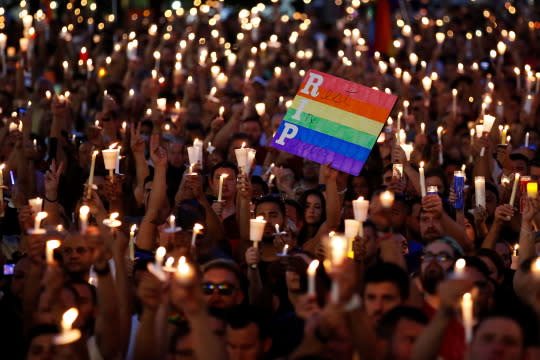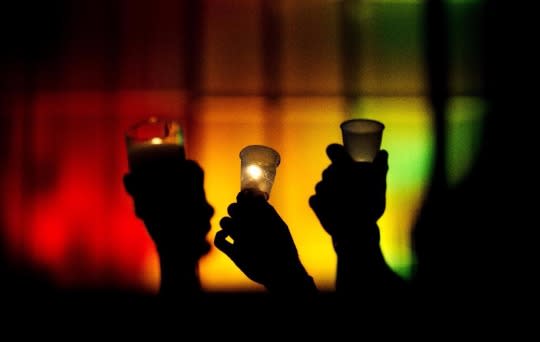Gay community reels after Orlando: ‘We are really suffering right now’
One year after “Love Wins” became the hashtag of the land following the Supreme Court’s landmark decision in Obergefell v. Hodges, a combustible mix of ancient hatred, modern weapons and personal instability led to the deadliest civilian gun massacre in U.S. history.
As Obama said Monday of the Orlando attack that took place in the early hours of Sunday morning, “The fact that it took place at a club frequented by the LGBT community I think is also relevant.”
It’s relevant especially within that community, where the shooting has dredged up bad memories of a less friendly America and raised questions about just how far LGBT people have really come.
These questions were only deepened late Monday by reports that the shooter, who died along with 49 other people in the attack, had used gay dating apps and had visited the nightclub Pulse multiple times. Omar Mateen was married to a woman — his second heterosexual marriage — and had a small child; news reports that he was attracted to or sought hookups with men raised questions about the extent to which self-loathing as well as broader animus might have played a role in actions politicians were quick to describe Sunday as a “hate crime.”
As investigators continued to gather evidence, take interviews and piece together the puzzle of what led Mateen to lash out, gay writers and leaders reeled, cast back into memories they would sooner forget.
“It was a punch in the gut, a flashback to those days of being hated and afraid,” E.J. Graf, author of “What Is Marriage For?,” wrote in Vice about the attack. “How we scarcely dared mention our ‘roommates’ at work, how teenagers spat on us on the street, threatening us and calling us vile names. Back then, if you went to the ‘women’s’ bar (in my day, we didn’t say ‘gay’) and left by yourself, the big butch bouncer would walk you out the door and watch as you headed for your car just in case some homo-hater was lurking there, looking to assault a queer girl or two. On Sunday, thousands of us remembered that there’s always someone who wants to murder you just for being gay — or even worse, wants to murder the young ones just coming up.”
The timing during Gay Pride month made the attack especially painful.

“We are really suffering right now,” Aisha Moodie-Mills, president and CEO of the Victory Fund, which seeks to increase the number of openly gay officeholders, told Yahoo News. “We’re in the middle of celebrating LGBT pride, the most joyous we are any time of year, literally celebrating being alive.
“And to have this kind of vicious attack on our community has literally been devastating. … This could have been any of us. I came out at a gay club. I met my wife at a gay club. The community is really suffering a tragic loss,” she said. The attack was “a reminder that even as we are coming up on a year of celebrating marriage equality … we’ve still got a lot of work to do to stomp out that hate.”
Amid the tears was a determination to remember that the fight for gay rights is far from over, despite recent court decisions and executive actions. “On Saturday … I thought about last year’s marriage decision, and how hard it is to keep the LGBT agenda focused on the real political needs of our community,” wrote Miriam Zoila Pérez, a former editor of Feministing.com, in Colorlines. “But now we are reminded. We are reminded that we are not that far from our violent history of rejection, policing, hostility. We are reminded that the first Pride was a riot, one led by queer and trans women of color, who were fighting back against the violence they faced at the hands of the police. And we will have to continue to remember that this violence will not be solved by increased violence against the Muslim community or calls for the war on terror.”
David Mixner, a longtime gay rights advocate, took to the gay news blog Towleroad to consider how the broader political environment could have contributed to the attack. “There are precincts of American politics filled with rhetoric against our community, our rights, our very being. Pastors advocate hate from their pulpits and legislation is submitted and enacted to demean us and sanction anti-LGBT discrimination. There are states passing laws to permit our fellow citizens to deny us a meal in a restaurant, a place to sleep at night, or even access to a restroom,” he wrote.

“Do these agents of bigotry really believe their cynical fear-mongering and attempts to write hate into the stature books did not contribute to the massacre at Pulse?” Mixner continued. “For years to come and without question we will have to continue fighting our oppressors in the streets and at the ballot box. We cannot rest until every hate-filled law is overturned. The best memorial to the dead of Orlando is a new birth of freedom,” he wrote.
Rachel Tiven, the incoming CEO of Lambda Legal, the nation’s oldest LBGT legal organization, also told Yahoo News that it was time for those who advocate against new or expanded protections for gays to take responsibility for the effect of their actions and their words.
Their attitudes, “everything from, ‘I don’t want to wash my hands in the sink next to you’ to ‘I don’t want to sell you a cupcake because you make me uncomfortable’ … contribute to an acceptance of ostracization that is incredibly dangerous,” she said. “And when you mix that with easy access to heavy weapons, why are people surprised that this is the outcome?”
The attack will only cause gay rights groups to redouble their efforts to press for full equality under the law, she predicted. “In a sad way I think it will invigorate people,” she said.
And one thing was clear: Whatever happened, hate would not be met with hate. “I think what’s notable is that we have always turned toward life and turned toward living and taking the anger and the frustration and turning it into love and pride,” said Tiven. “That is the source of our success and why we will continue to thrive — that we respond not in a vengeful way, but with pride and love.”
Related slideshows:
Slideshow: Victims of the Florida nightclub shooting >>>
Slideshow: Front-page coverage of the Orlando mass shooting >>>

